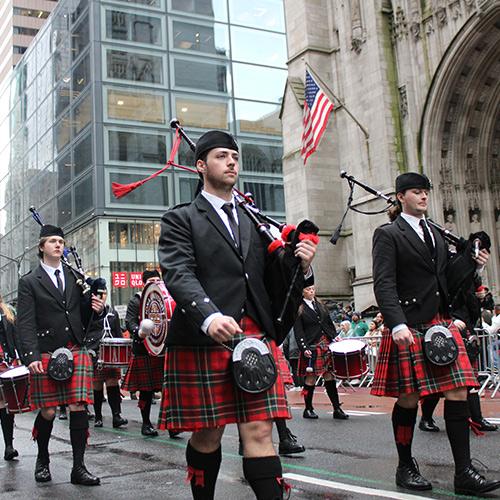Bias Incident Response Protocol
Iona University values a community where all members feel welcomed, included, and supported. Iona University established a Bias Incident Response (BIR) Protocol to ensure that all members of our community, students or employees, affected by an encounter with a bias incident have the necessary support as well as information related to available appropriate resources as soon as possible.
Iona University values the inherent dignity of each member of the Iona community, which is enriched by our diversity and sustained by civility and mutual respect. Grounded in the Iona Mission, the legacy of Blessed Edmund Rice and the Christian Brothers, the Bias Incident Response Protocol was created to advance an educational, working, and living environment free from discrimination, harassment, intolerance, and hate.
The BIR Protocol may be enacted to ensure that affected students and others have access to appropriate resources, assist departments and individuals in response, and to facilitate a coordinated campus response to bias-related incidents and situations that may impact campus climate.
Some actions may violate the Code of Conduct and will be addressed through the University judicial process. Even when this occurs there may be circumstances where individuals involved will also be referred to the supportive resources enacted by the BIR protocol. Some actions and situations may not violate law or policy but, nonetheless, fail to support our vision of a community of respect, openness, understanding, and civility. This protocol not only provides assistance and support to individuals filing a report, it works with the appropriate offices to keep records of bias incidents when directed, and to recommend that members of the community have appropriate access to information related to these incidents. The members of the Bias Incident Response Team also serve as liaisons to members of the community who may not know where or how to seek appropriate resources.
The purpose of the Bias Incident Response protocol is to promote an appreciation for diversity through understanding, respect, civility, and education. Individuals in the response pool will be assigned cases as individuals or small groups by the Dean of Students or their designee. These groups will be called Bias Incident Response Teams (BIRT). BIRTs will respond through enacting the below protocols as directed by the Vice Provost of Student Life or their designee.
The Bias Incident Response Team pool may consist of, but is not limited to, individuals who serve as members of Iona University Harassment and Discrimination pool, the Student Life Diversity Committee, the University Council Committee on Diversity, and/or members of campus student groups, administrative or academic offices. Their purpose is to:
- Educate the Iona University community about the protocol for reporting bias incidents and the purpose of the Bias Incident Response protocol.
- Assist students and employees who report bias incidents. This will be done by prompt outreach, listening to their account of their experiences, discussion and referral to resources, and available options of addressing the incident.
- Support individuals impacted by bias incidents and/or hate crimes, especially those who have been directly involved including any identified groups that may have been affected.
- Assist the VPSL and the University in the coordinated campus response to bias incidents or hate crimes that threaten or potentially threaten the wellbeing of our students or the campus community.
- Recommend the dissemination of accurate information to the affected person(s) and the campus community, as necessary.
- Assist in record keeping of the incident and follow-up action steps.
- Recommend and/or plan various community advocacy, educational, and awareness programming and actions that are both preventative and responsive.
- Work closely with the appropriate administrators, committees, organizations, and departments to help foster an inclusive and supporting campus climate for all members of the Iona community. This includes but is not limited to collaboration with and support of the University Council Diversity Committee, the Student Life Diversity Committee, the Student Government Association, and the Student Leadership Alliance for Multiculturalism.
- We do not work parallel to or isolated from the official disciplinary, reporting, and related response protocols of the University.
- We are not a judicial or disciplinary body. We do not decide responsibility, guilt or innocence and are not part of the disciplinary process.
- We are not an investigative team. We take reports about bias incidents and we discuss options for moving forward.
- We are not a crisis response team. If a situation is immediately threatening, the first response is the New Rochelle Police department and the Office of Safety and Security. If the situation involves a bias incident, a bias incident report can be submitted at a later time.
Every effort will be made to treat reporters as confidential if requested, but reports are not anonymous. We recognize that at times sensitive or personal information will come to our attention. It will be handled with discretion and respect. This will be balanced with the determination at times that the University community may need to be made aware that an incident has occurred, and what steps have been taken to address it. Options for confidential consultations are available with the appropriate members of the clergy while acting in their official capacity as well as members of the Iona University Counseling Center staff.
Bias Incident
A Bias Incident is conduct or behavior—verbal, nonverbal, written or physical—which is threatening, harassing, intimidating, discriminatory, or hostile and is personally directed against or targets and individual or group based on perceived or actual characteristics including but not limited to race, color, religious belief, sex, marital status, sexual orientation, gender identity or expression, national or ethnic origin, disability, veteran status, socioeconomic or age. Behavior reflecting bias may constitute a violation of Iona University Code of Conduct.
Hate Crime
Federal and state statutes on hate crime vary in terms of the acts and categories of bias that are covered. Under New York State Law, a hate crime is committed when a person commits a specified offense and (1) either intentionally selects the person against whom the offense is committed or intended to be committed, or (2) intentionally commits the act or acts because of a belief or perception of the person’s or group’s race, color, national origin, ancestry, sex, religion, religious practice, age, disability, or sexual orientation, regardless of whether the belief or perception is correct. When a person is convicted of a hate crime pursuant to Article 485 of New York State Hate Crimes Act of 2000, the law provides for the level of a hate crime to be deemed one category higher than the specified offense, when that specified offense is a misdemeanor or a class C, D or E felony. When the specified offense is a class B or A¬1 felony, the term of sentence is enhanced.
Note: All hate crimes are bias incidents, but not all bias incidents are hate crimes. BIR reports may enact BIR protocols in addition to Code of Conduct, Title IX, and/or other related procedures as determined by the VPSL or their designee.
What are the criteria for selecting what to report?
When a report is received, the content is reviewed by the VPSL or their designee to determine if factors of race, color, religious belief, sex, marital status, sexual orientation, gender identity or expression, national or ethnic origin, disability, veteran status, or age are present and if there is evidence or information pointing to possible bias.
The impact of a behavior and spoken or written expression on individuals, groups or the campus community that may not reach the level of a bias incident, but has an impact or potential impact on campus climate is also considered. Iona University protects an individual’s right to free speech and open expression. However, free speech does not justify discrimination, harassment or speech that may be biased or hateful.
When recommendations of notifications to the community are made, information such as general descriptions and location of the incident when relevant may be shared. Specific Attempts will be made not to report personal identifying information to the broader community.
Students, faculty, and staff may report a Bias related incident directly to the Department of Campus Safety and Security, Office of Residential Life, Dean of Students. There are multiple points of entry to report an incident and students can report through whichever appropriate pathway they are comfortable doing so.
For record keeping purposes, all reports of an alleged bias related incident should be documented in writing via the appropriate electronic mechanism at some point in the process regardless where they were first reported. The following information should be included:
- Detailed account of incident, date, time, and location
- Relate to the best of your ability the specific content of the words, gestures, or other behavior
- Identify the alleged perpetrator, if known to you and/or provide a detailed description
- List all witnesses and contact information
- Attach or upload written information (such as e-mails or images).
- All reports will come to the Vice Provost of Student Life and or their designee. A prompt determination of appropriate response will be made and initiated.
- The reporter will receive timely confirmation of the report.
- The VPSL or their designee will assign an individual or Bias Incident Response Team (BIRT) if appropriate.
- The BIRT will be comprised of members of the response pool. The Bias Incident Response Team pool may consist of, but is not limited to, individuals who serve as members of Iona University Harassment and Discrimination pool, the Student Life Diversity Committee, the University Council Committee on Diversity, and/or members of campus student groups, administrative or academic offices.
- When possible, reporters of incidents will be notified and/or consulted on the composition of the bias incident response team. This will be done in the effort of easing reporting to reduce fears of who will have knowledge of the report. Individuals in the response pool will be assigned cases as individuals or small groups.
- Bias Incident Response teams will respond through enacting protocols.
- A BIRT member will seek additional information regarding the incident, provide support resources, and schedule a time to meet with reporter and or affected individuals, if appropriate. The main purpose of this contact is to make sure the reporter and other individuals feel safe and cared for.
- BIRT will recommend and implement, where appropriate, programs or activities
- BIRT determine what recommendations* will be made to the VPSL or their designee for notification to the Iona Community. Recommendations may include:
- Campus wide email immediately following the response
- Notification in the campus newspaper in the following issue
- Post on the University website
- Quarterly report in the campus newspaper and on the website
- Report to the Committee on Diversity
- *Consideration will be given to the context of the incident, how it will affect campus constituencies, and consult with relevant constituencies if necessary before notifying the community.
- If no action is possible or necessary, the incident will be documented.
- If the incident is actionable, the BIRT will develop and recommend an action plan to then execute while documenting the plans and resolutions.
- If the VPSL or their designee determine the reported incident may violate the law or Iona University policy, the appropriate protocol response will be enacted and may include but is not limited to:
- Student Code of Conduct
- Title IX
- Ombudsperson
- Harassment and Discrimination Committee
- Iona Human Resources/Employee Relations
- Supervisors/Deans/Other Campus Administrators
- New Rochelle Police Department
- Responses may include, but are not limited to, identification of and referral to appropriate support service and resources (on and off campus)
- Facilitated campus discussions in residence halls or other locations,
- Recommendations for campus notices for fact sharing,
- Efforts toward wider educational awareness, prevention, and outreach.


